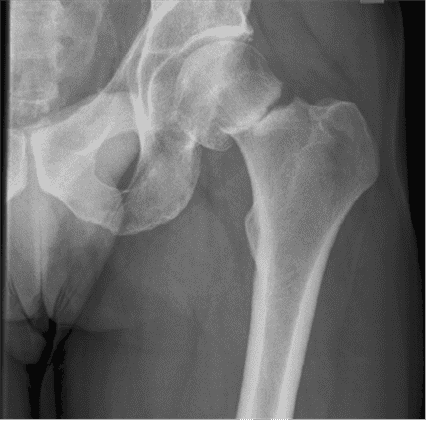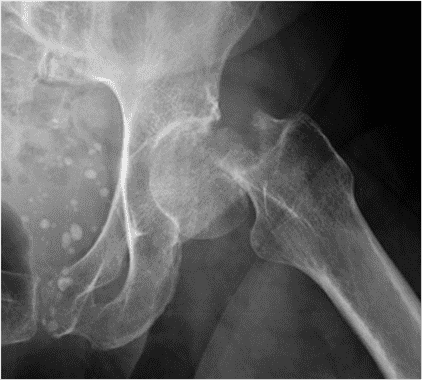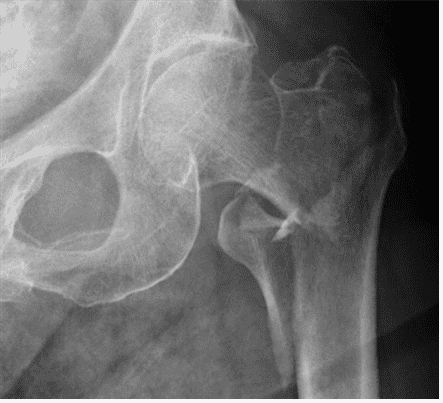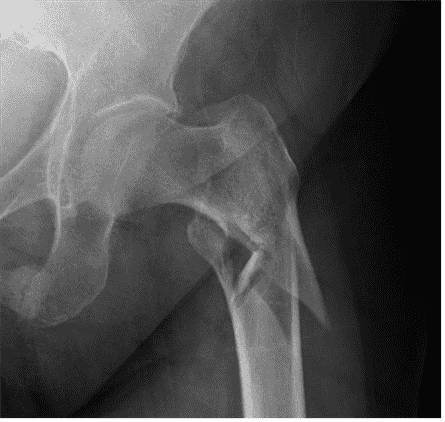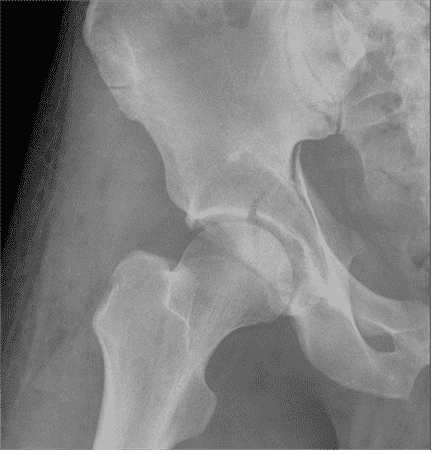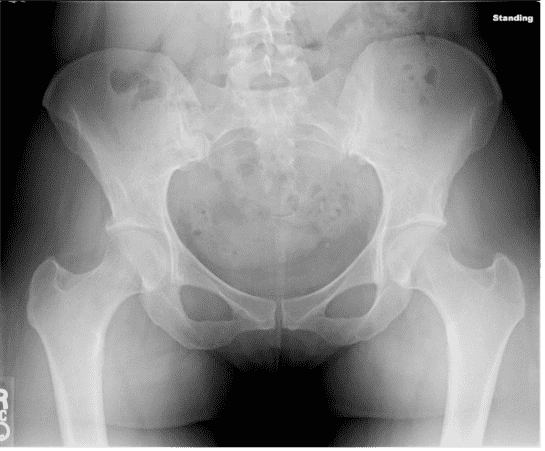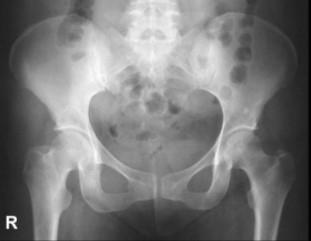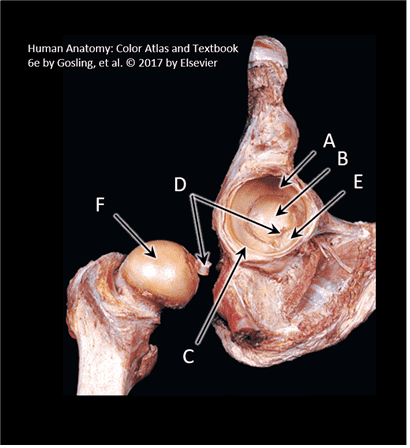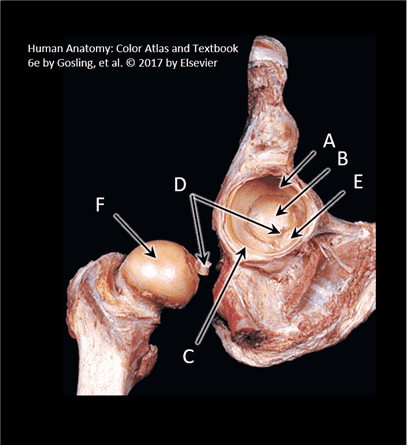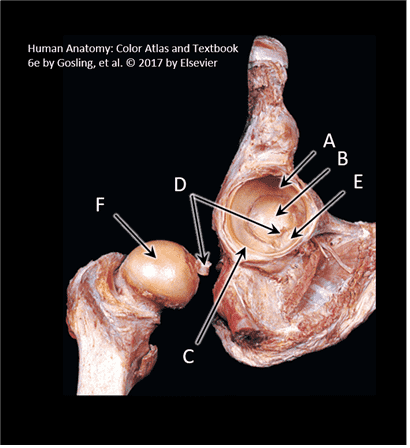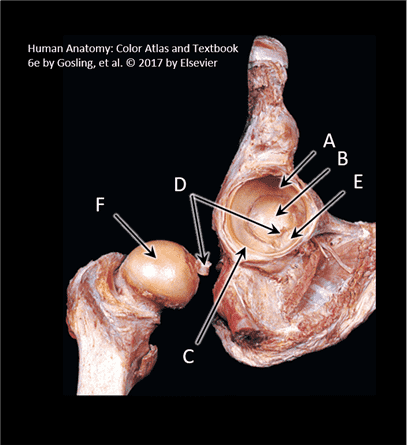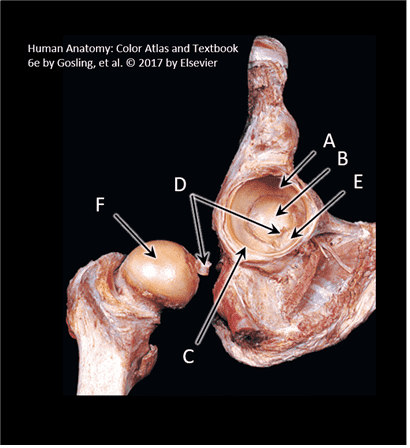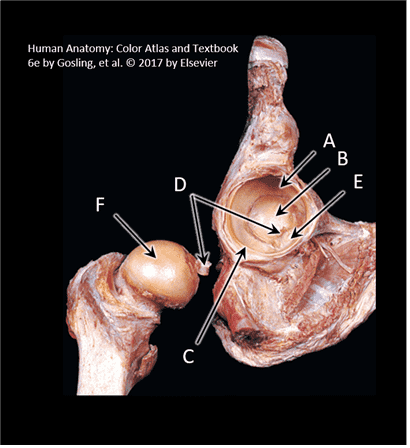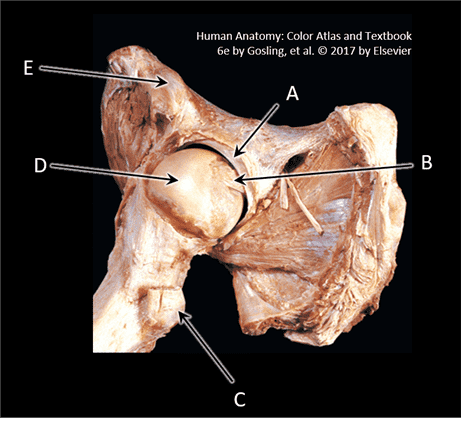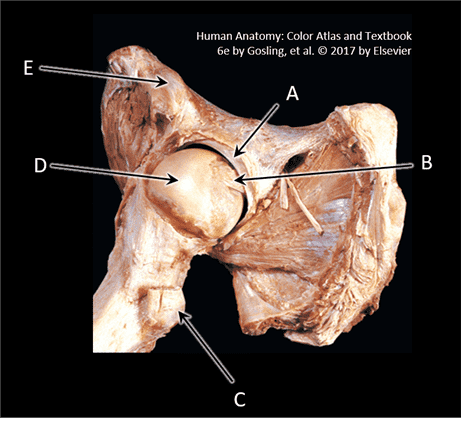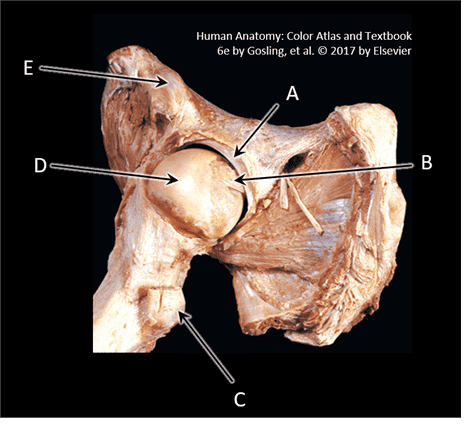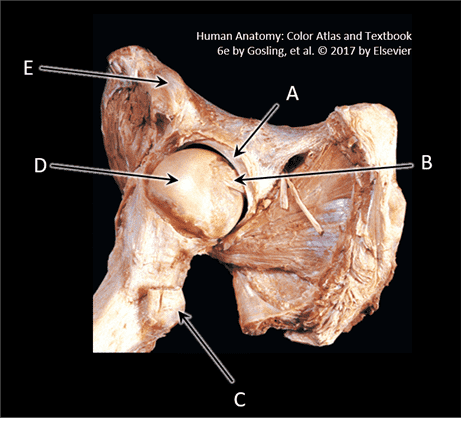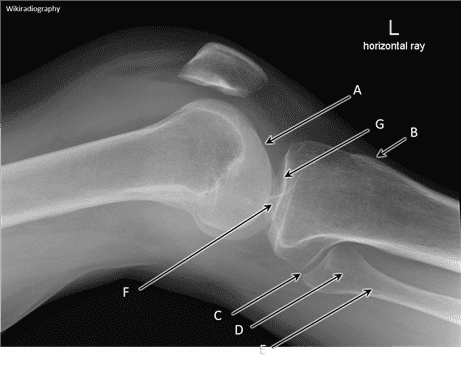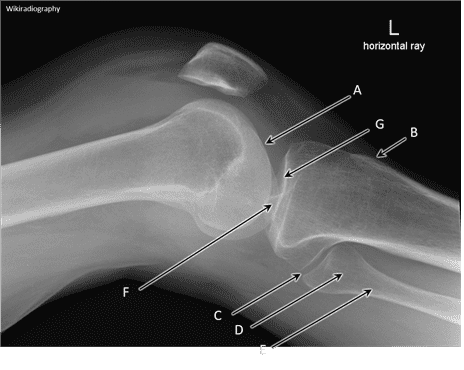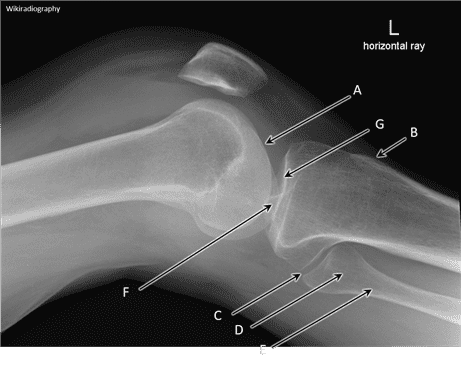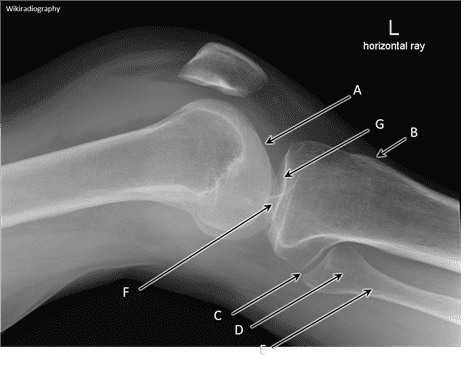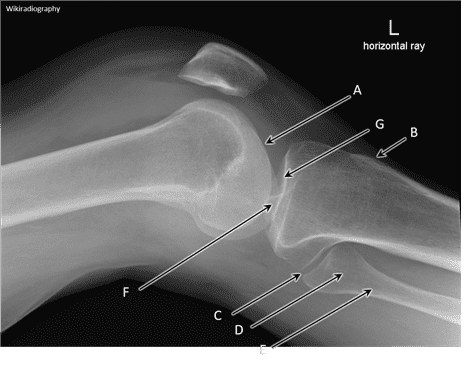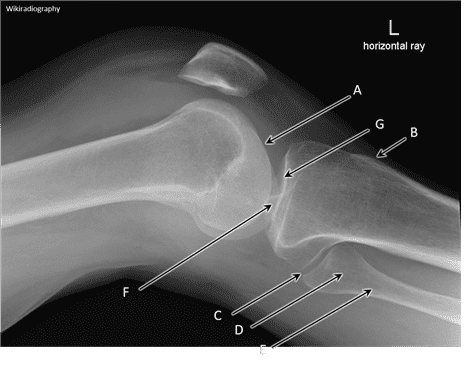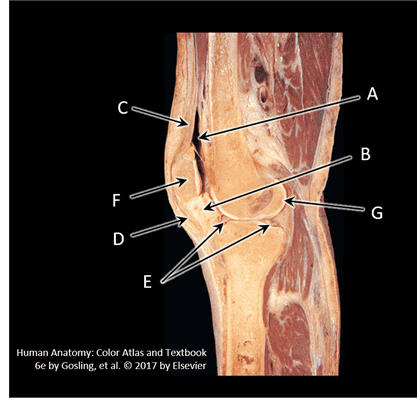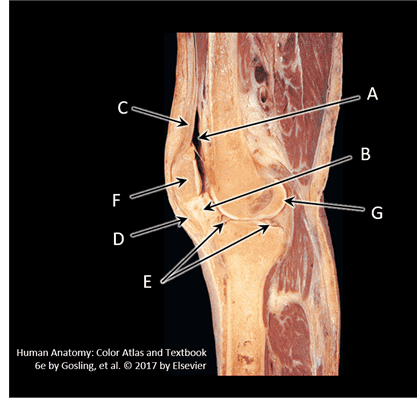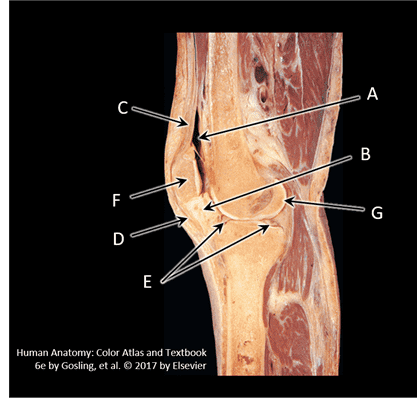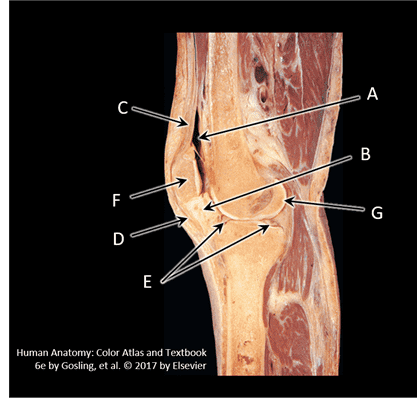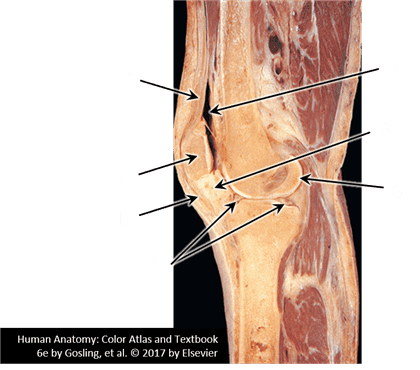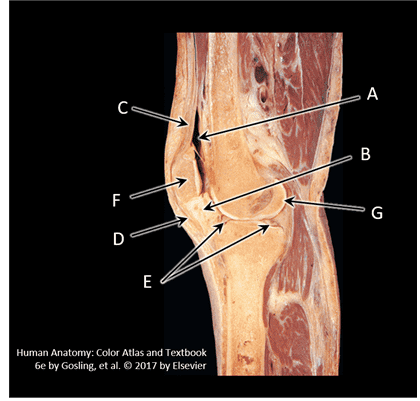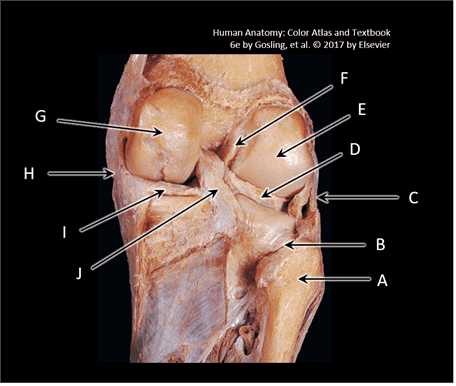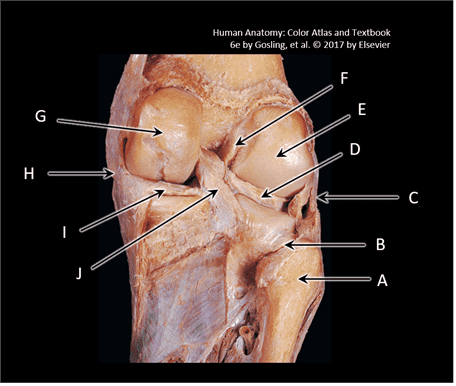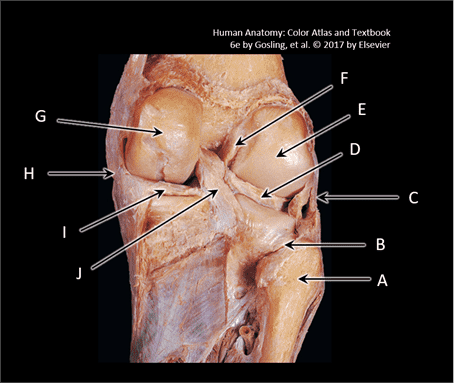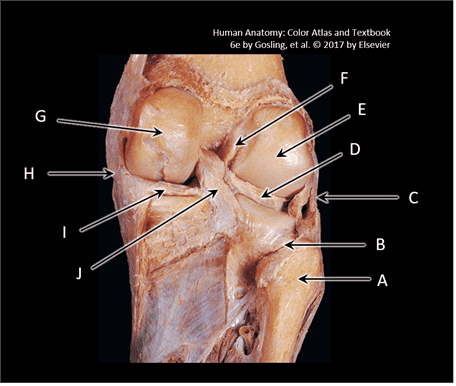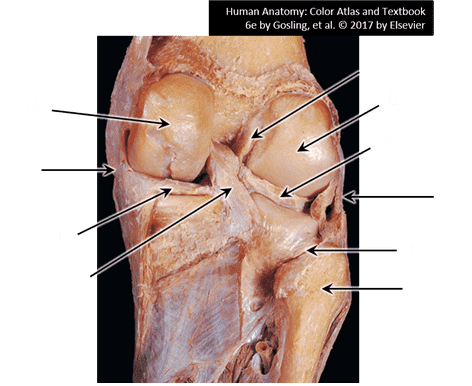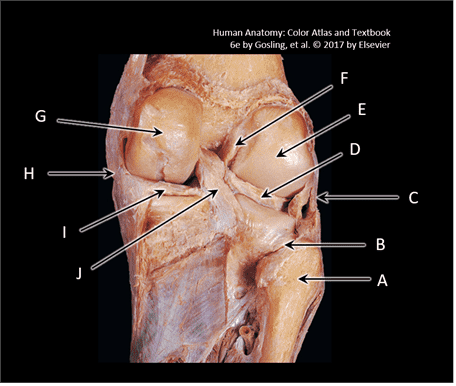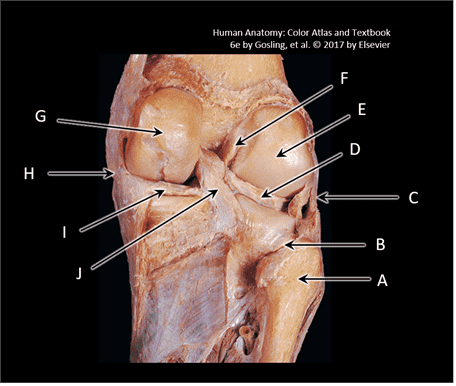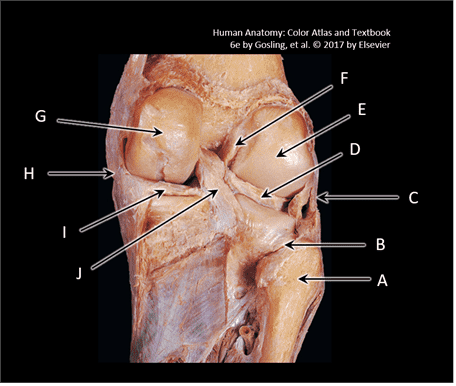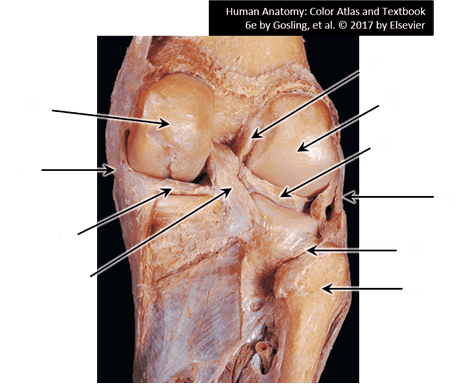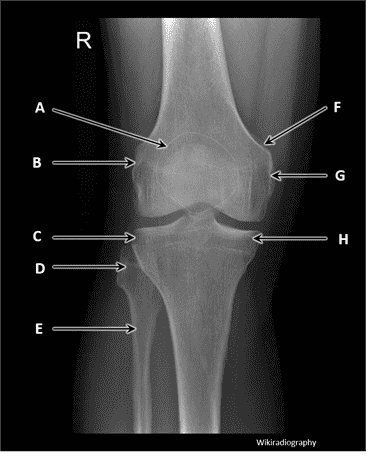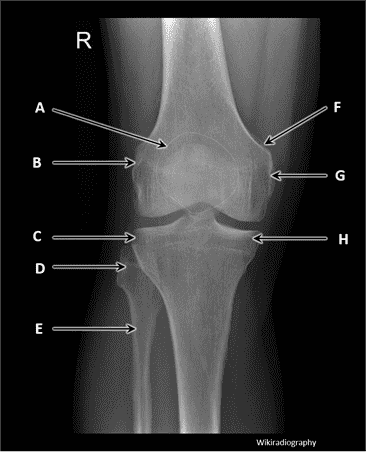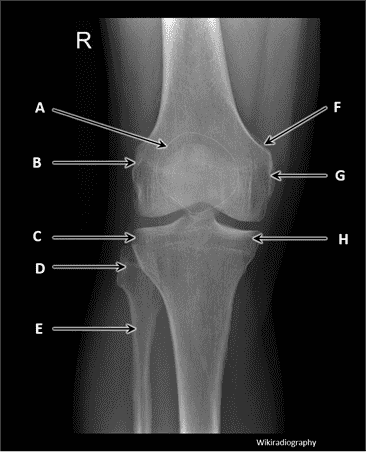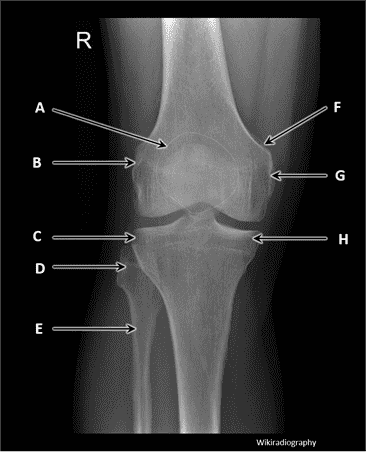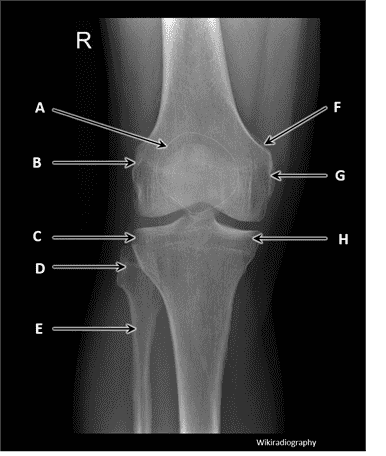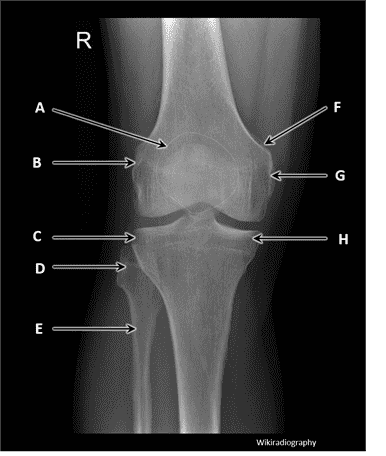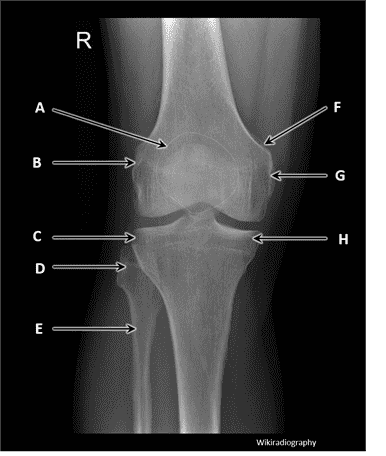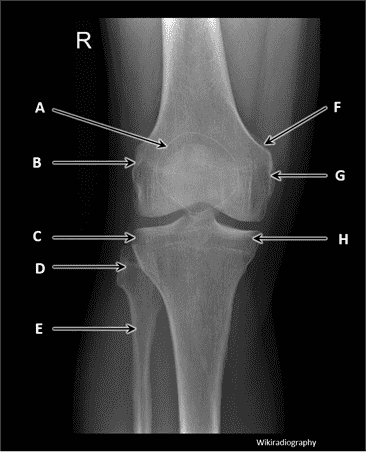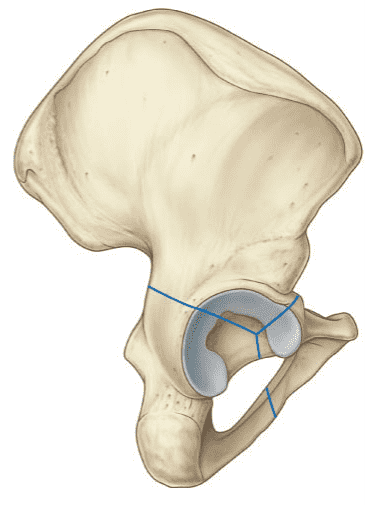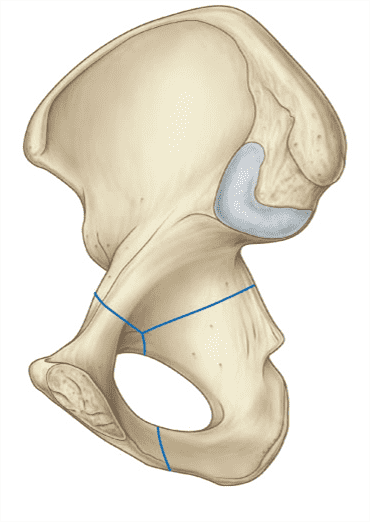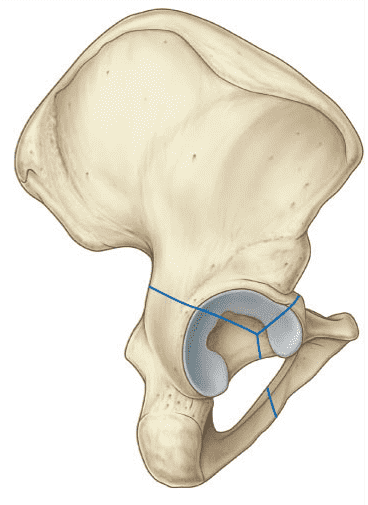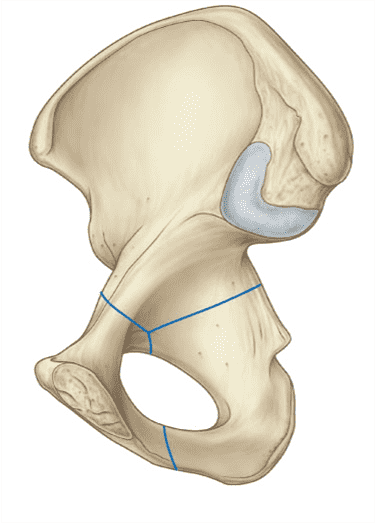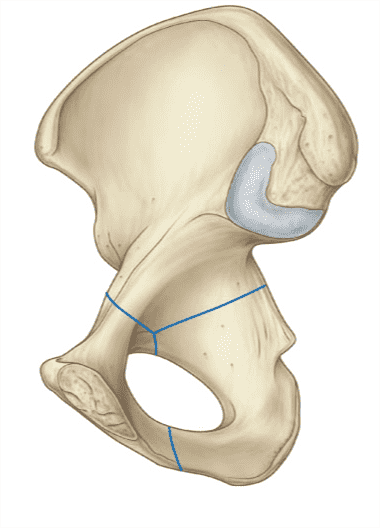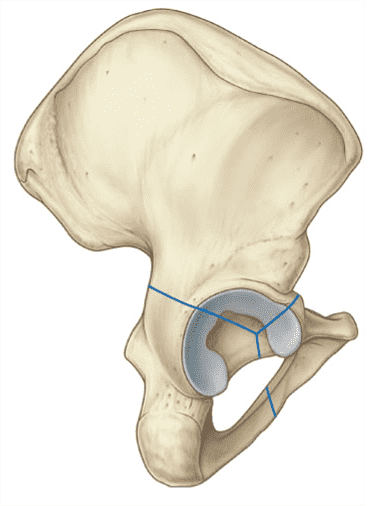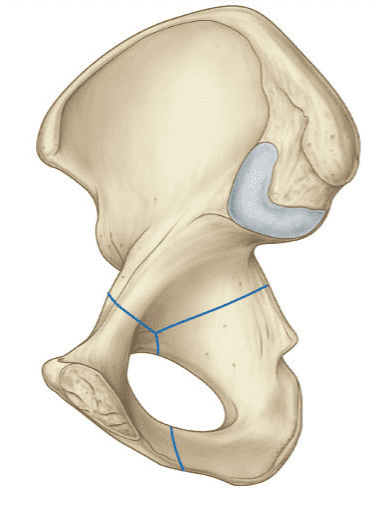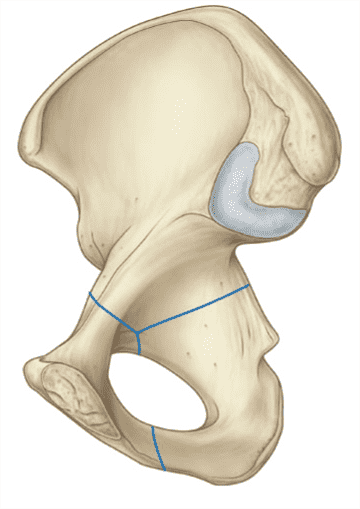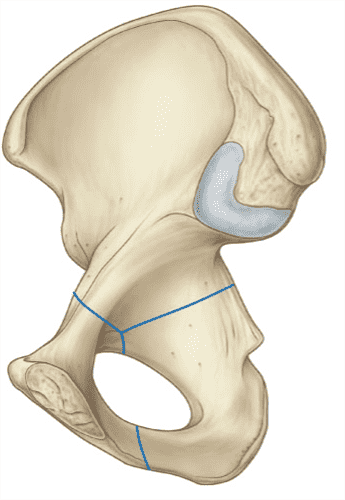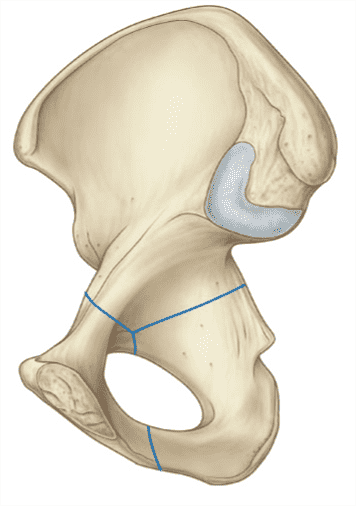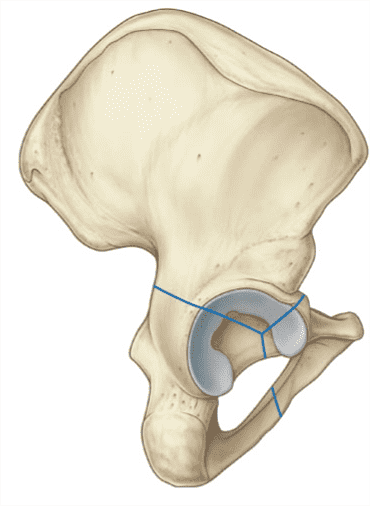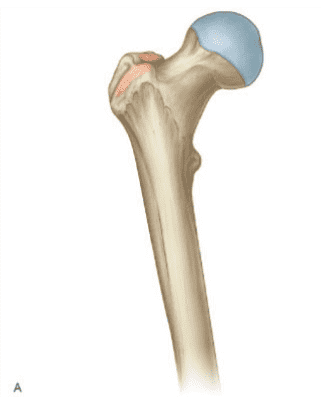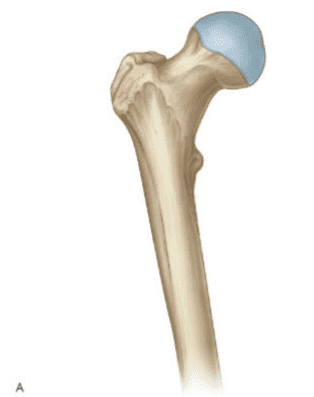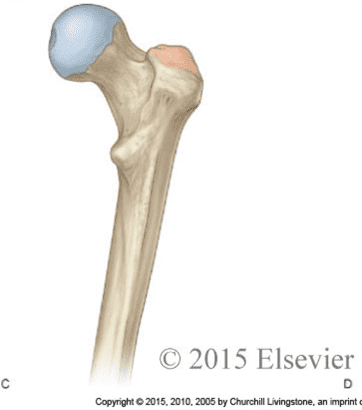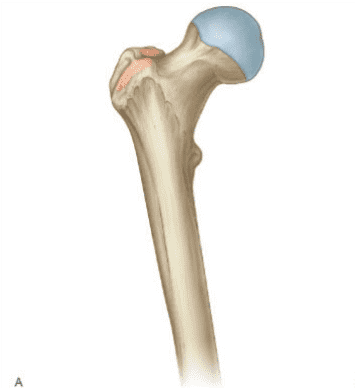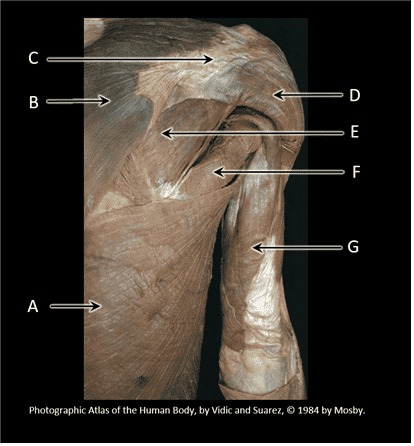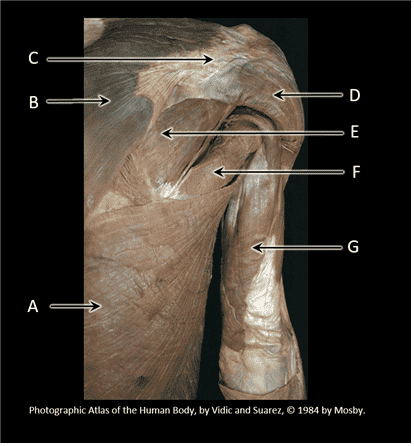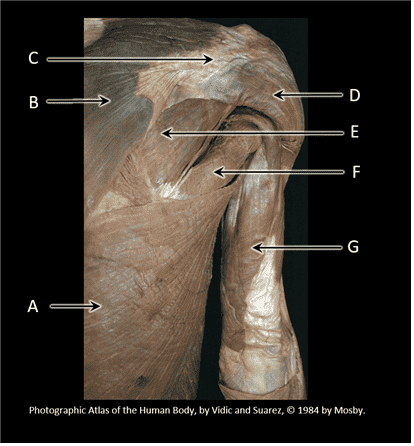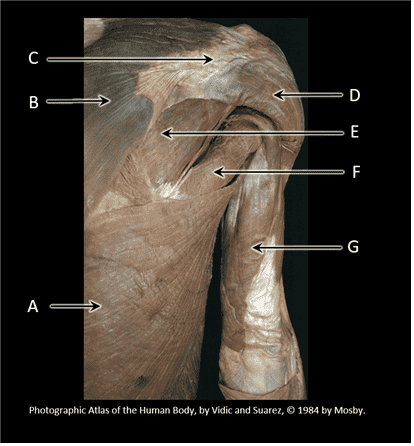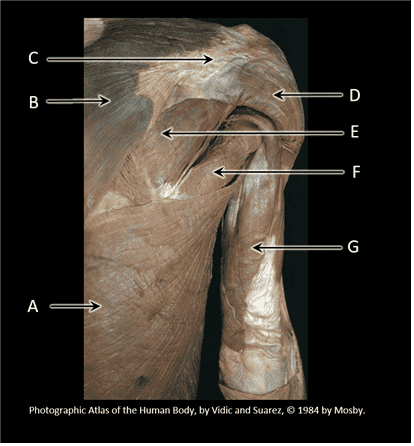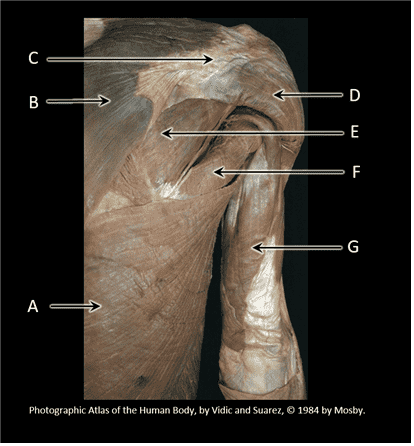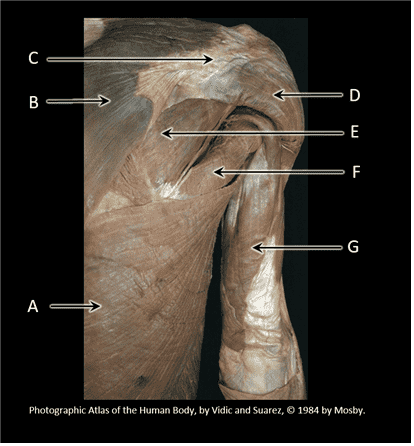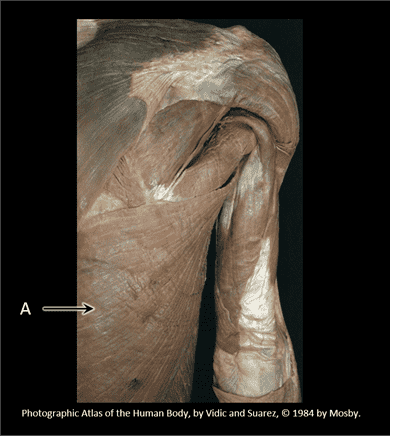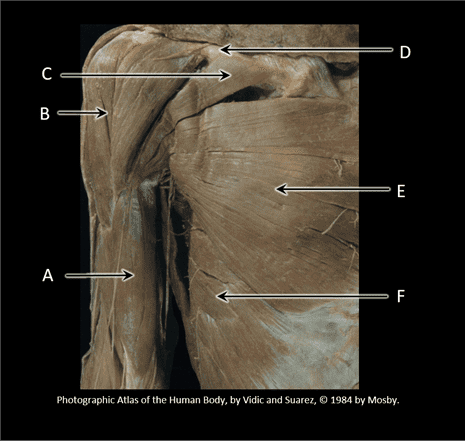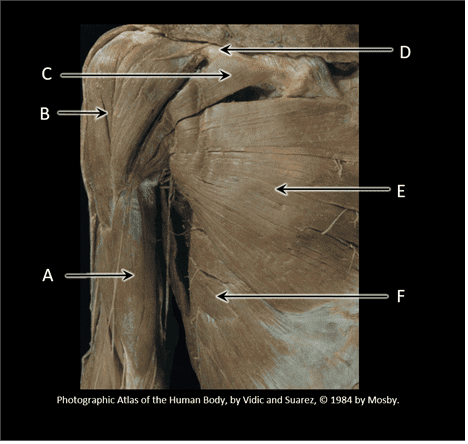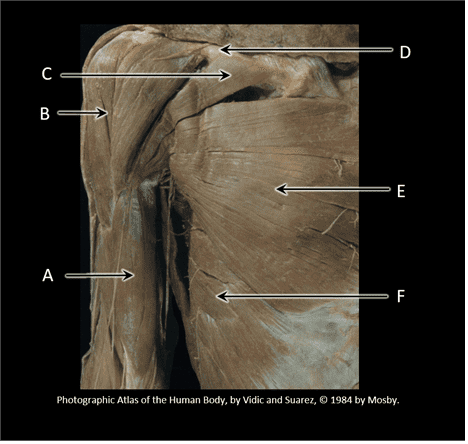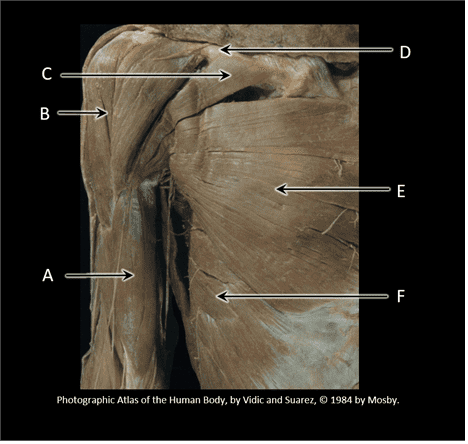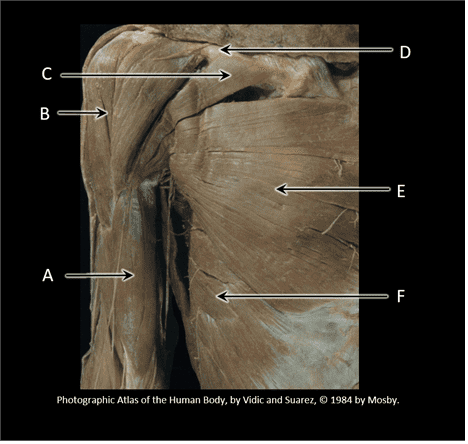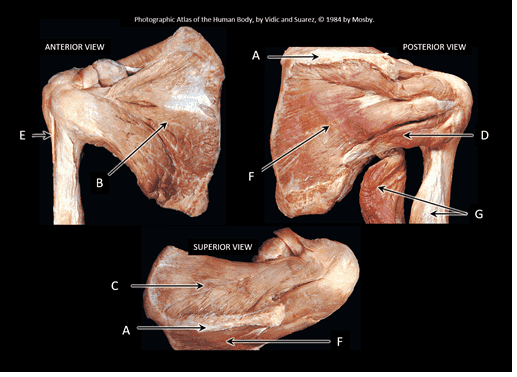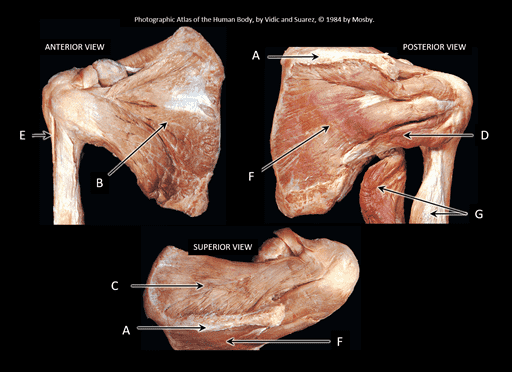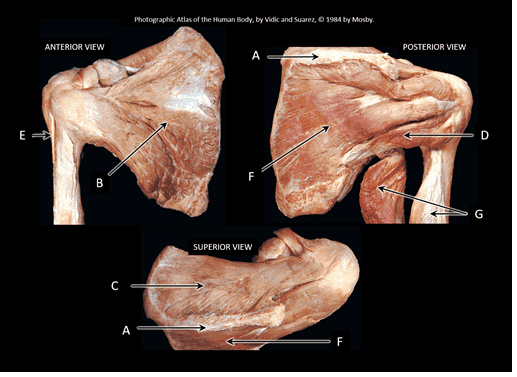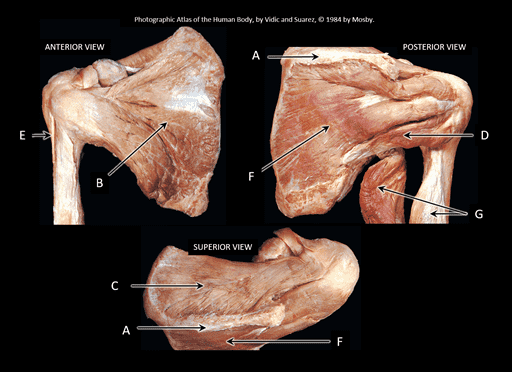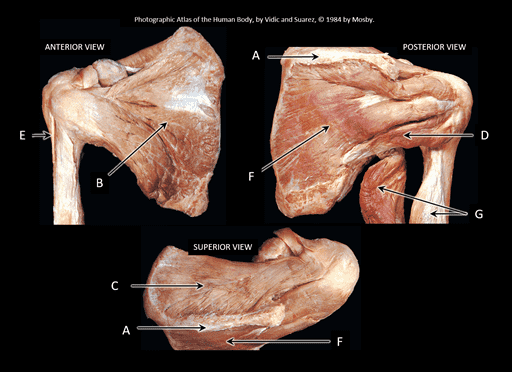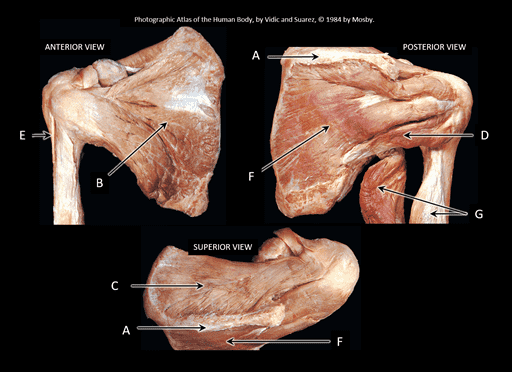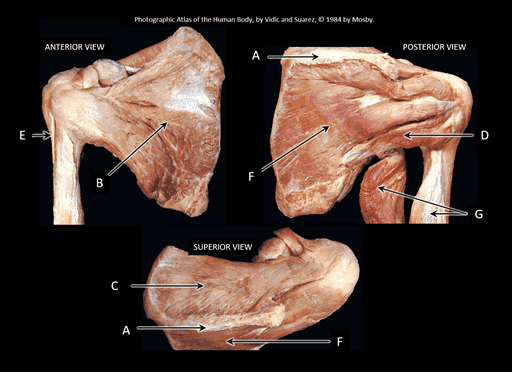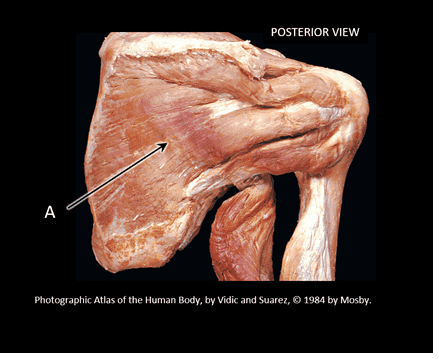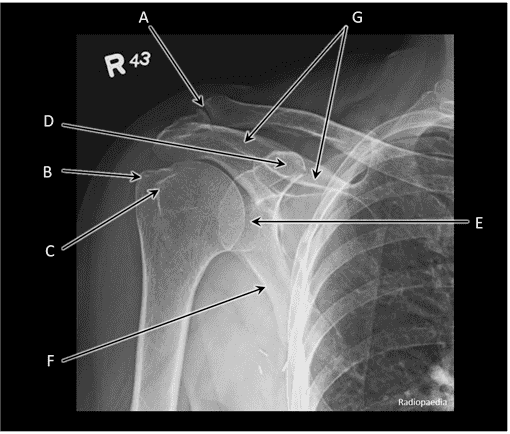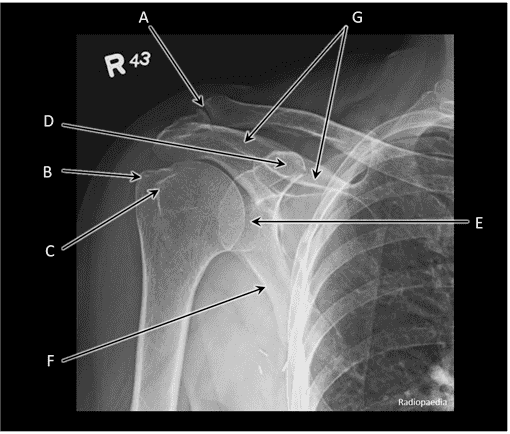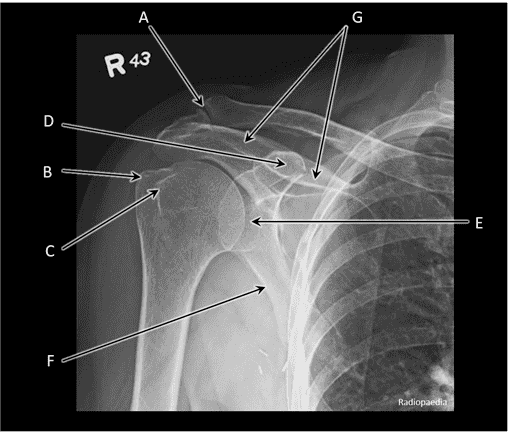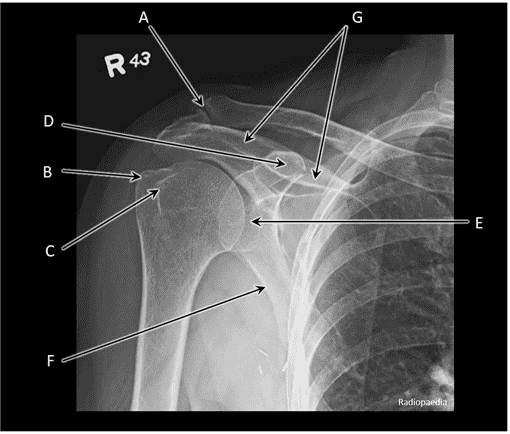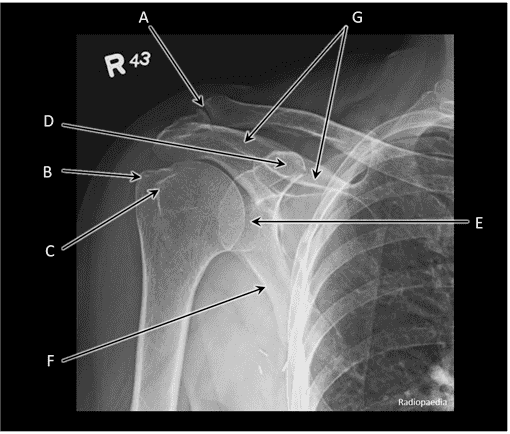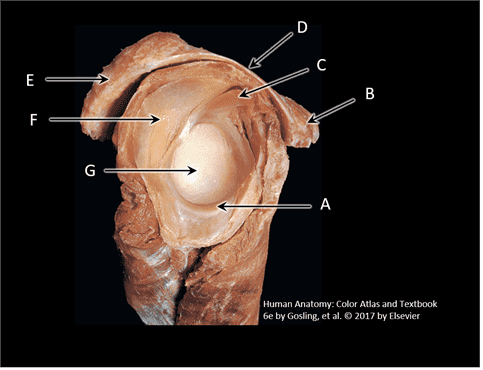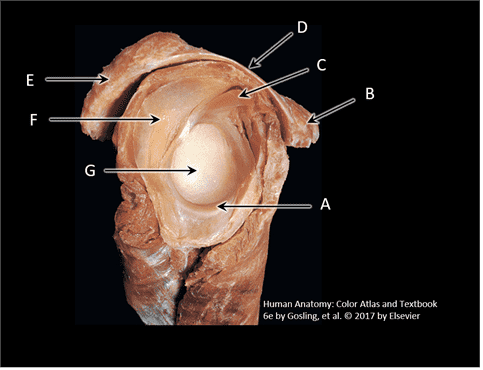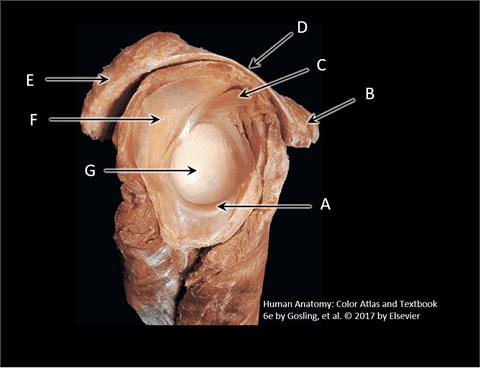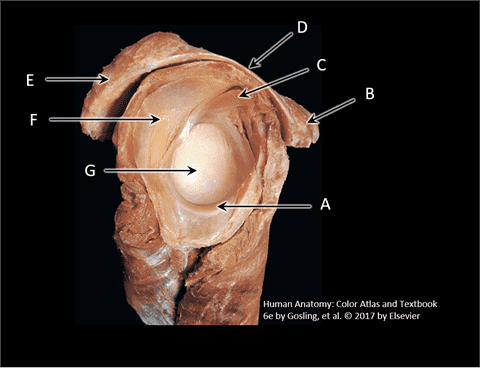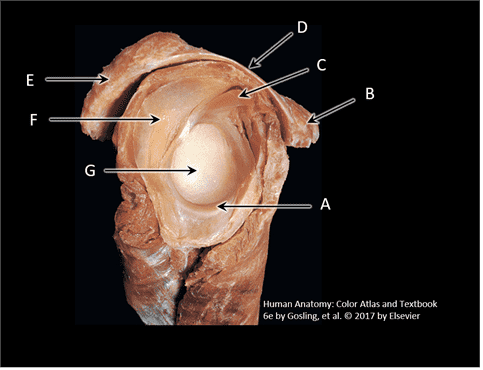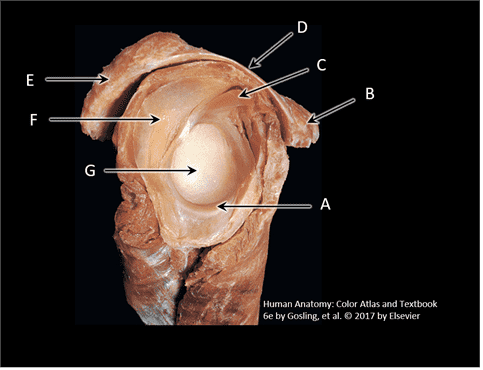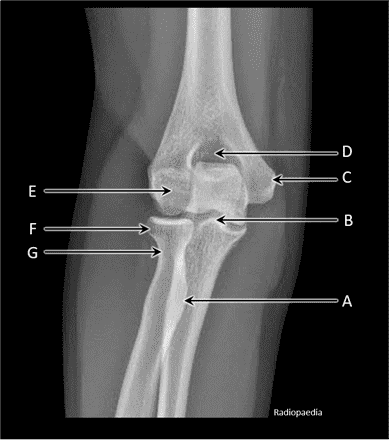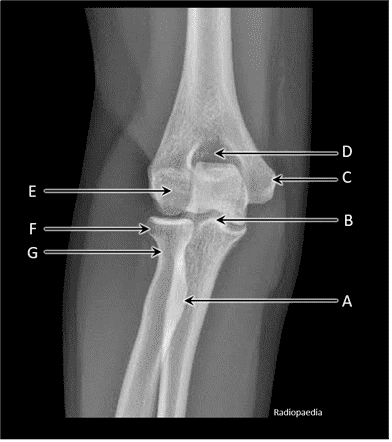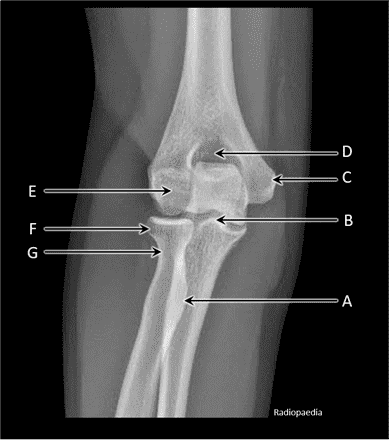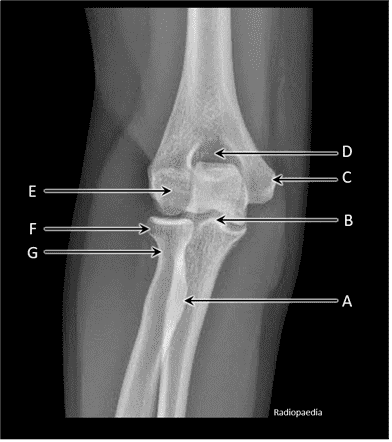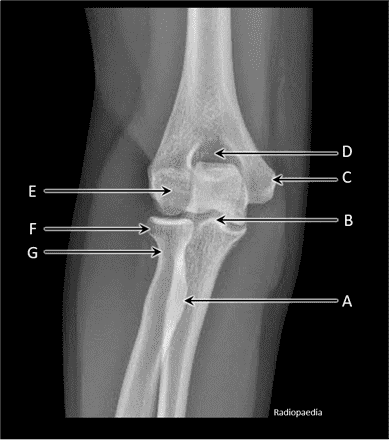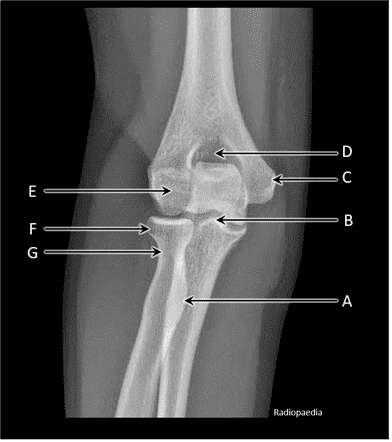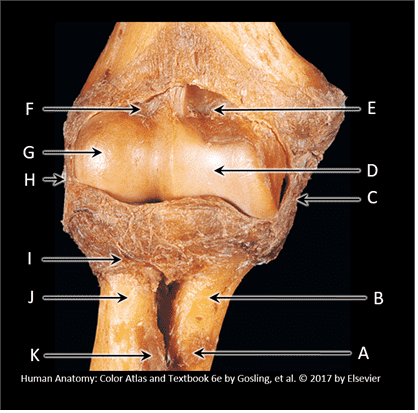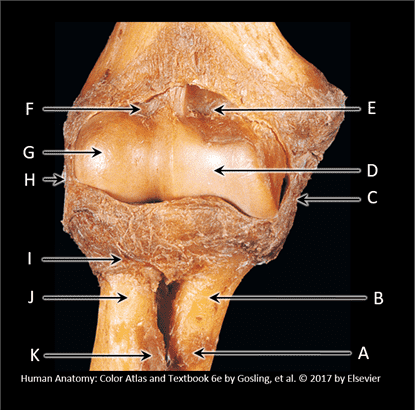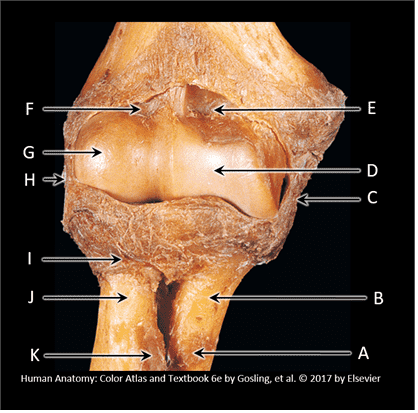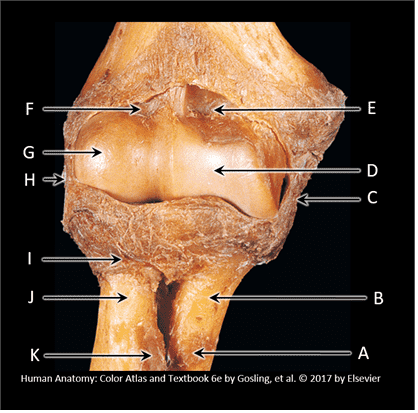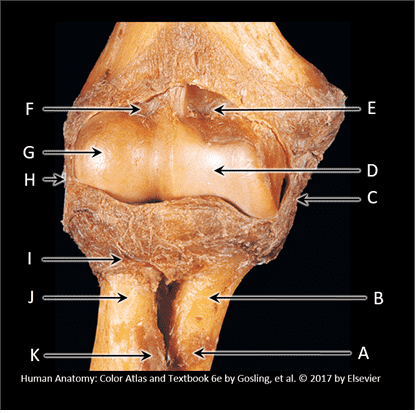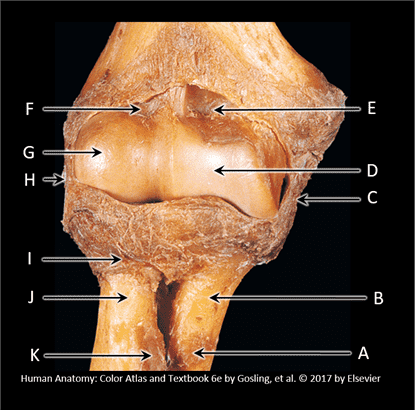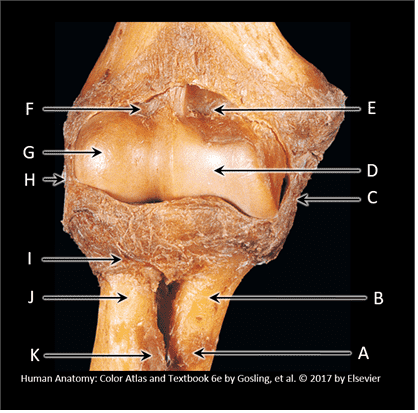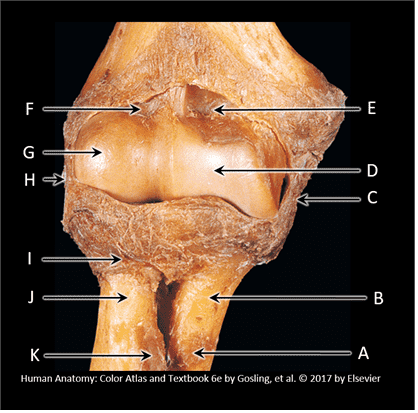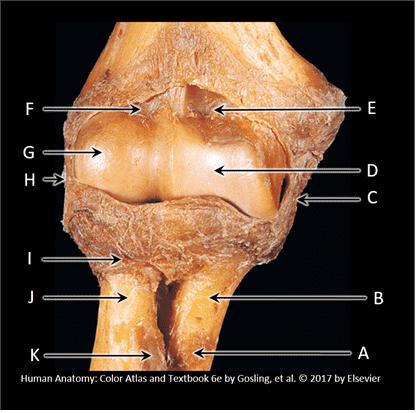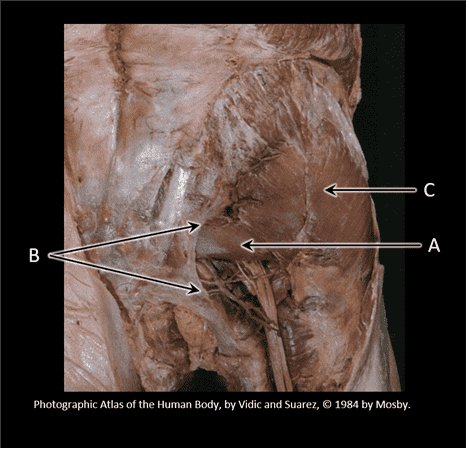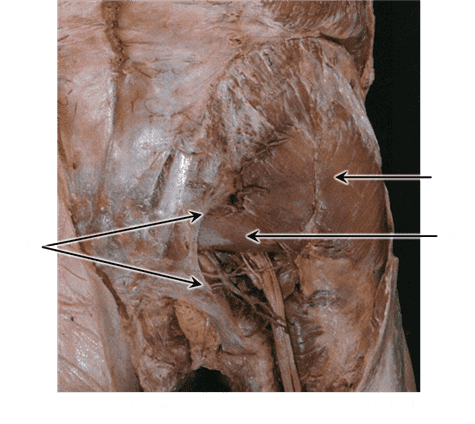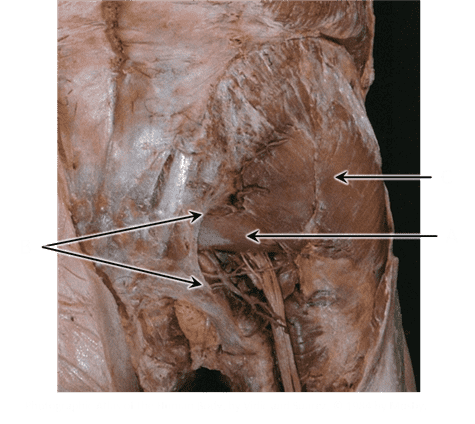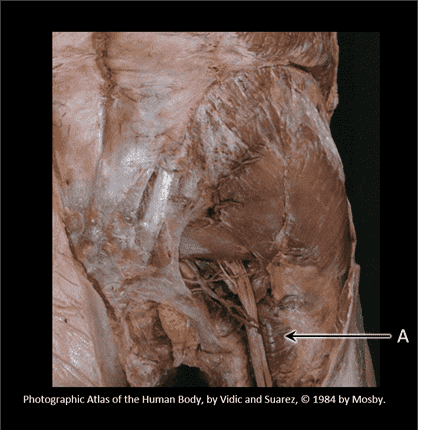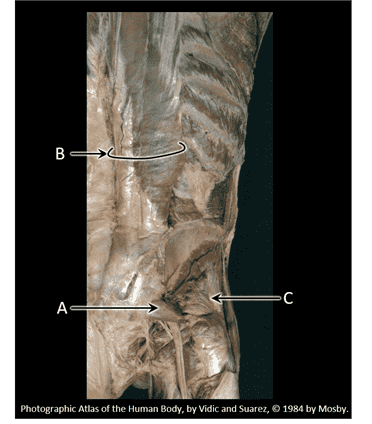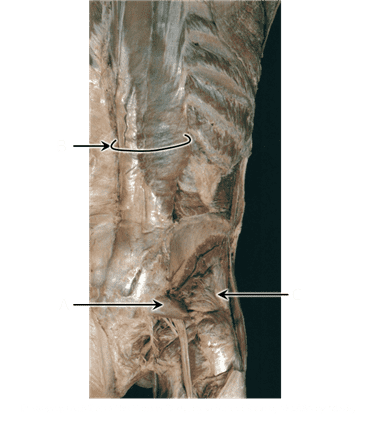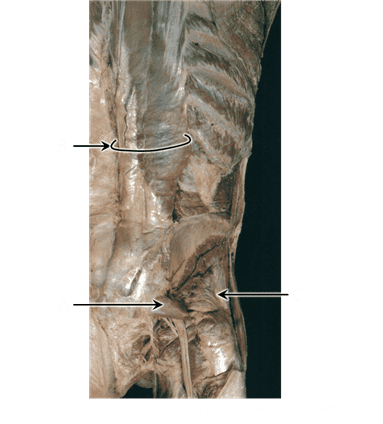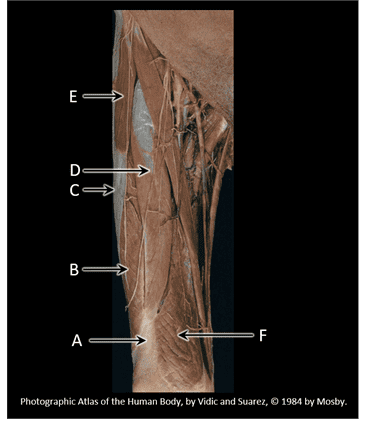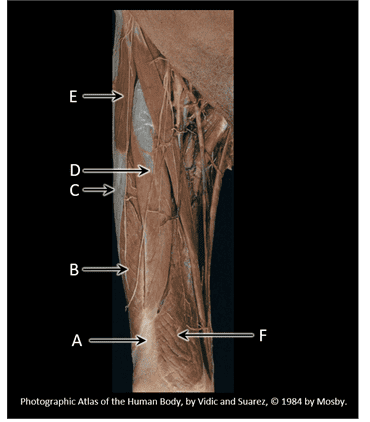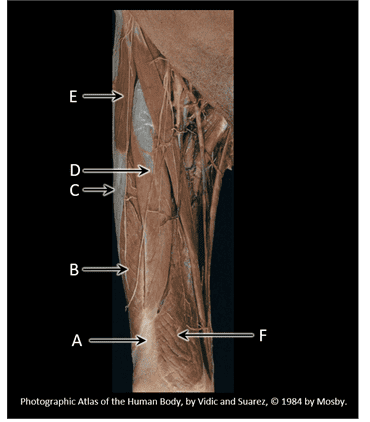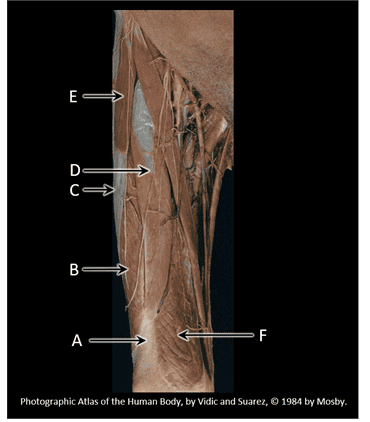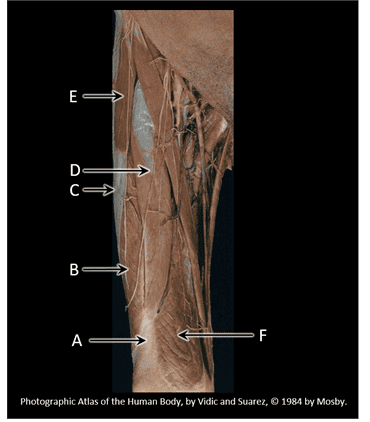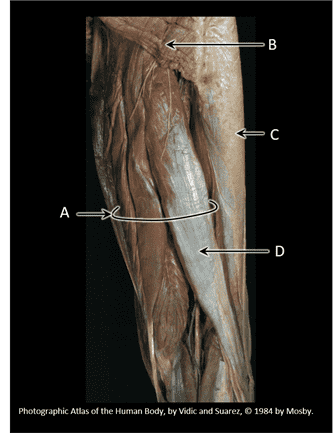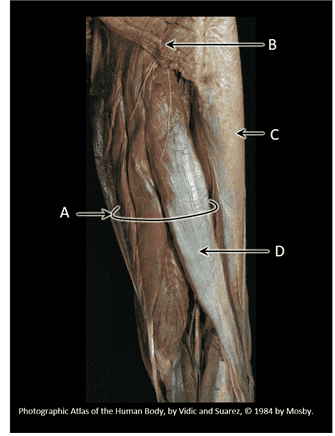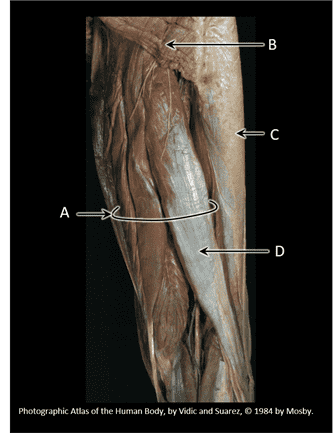14.3 Question 1
1) What is the anatomical location of the fracture identified by the blue arrow?
Choices:
- Femoral neck
- Intertrochanteric
- Subtrochanteric
- Acetabulum
Answers:
- Femoral neck
Comments:
- Correct
- That's right! This image indicates a fracture of the femoral neck. This type of fracture affects blood supply to the head of femur, causes avascular necrosis and requires hip replacement !!
- Continue
14.3 Question 2
2) This is a complete and totally displaced fracture of the femur. Where is the exact fracture location anatomically? Fracture identified by the blue arrow.
Choices:
- Acetabulum
- Neck of femur
- Intertrochanteric
- Femoral head
Answers:
- Neck of femur
Comments:
- Correct
- That's right! Same as the last question, this image indicates a fracture at the femoral neck/neck of femur.
- Continue
14.3 Question 3
3) What is the anatomical location of the fracture identified by the blue arrows?
Choices:
- Acetabulum
- Neck of femur
- Intertrochanteric
- Subtrochanteric
Answers:
- Intertrochanteric
Comments:
- Correct
- That's right! The blue arrows indicate a fracture at the intertrochanteric region.
- Continue
14.3 Question 4
4) What is the anatomical location of the fracture identified by the blue arrow?
Choices:
- Acetabulum
- Neck of femur
- Intertrochanteric
- Subtrochanteric
Answers:
- Subtrochanteric
Comments:
- Correct
- That's right! The image indicates a fracture at the subtrochanteric region.
- Continue
14.3 Question 5
5) What is the anatomical location of the fracture identified by the blue arrow?
Choices:
- Acetabulum
- Neck of femur
- Intertrochanteric
- Subtrochanteric
Answers:
- Acetabulum
Comments:
- Correct
- That's right! The image indicates a fracture at the acetabulum.
- Continue
14.3 Question 6
6) What is the feature identified by the blue arrow?
Choices:
- Acetabulum
- Neck of femur
- Head of femur
- Obturator foramen
Answers:
- Acetabulum
Comments:
- Correct
- That's right! The blue arrow is pointing at the acetabulum.
- Continue
14.3 Question 7
7) What is the feature identified by the blue arrow?
Choices:
- Lesser trochanter
- Neck of femur
- Greater trochanter
- Shaft of femur
Answers:
- Lesser trochanter
Comments:
- Correct
- That's right! The blue arrow is pointing at the lesser trochanter. Lesser trochanter is located on the medial side of femur and is the attachment point of the iliopsoas (hip flexors).
- Continue
14.3 Question 8
8) Identify A. Be specific.
Choices:
- Lunate surface
- Acetabular fossa
- Acetabular labrum
- Ligament of the head of the femur
- Transverse acetabular ligament
- Head of femur
Answers:
- Lunate surface
Comments:
- Correct
- That's right! ‘A’ indicates lunate surface. This articular surface of acetabulum articulates with head of femur, forming the hip joint.
- Continue
14.3 Question 9
9) Identify B. Be specific.
Choices:
- Lunate surface
- Acetabular fossa
- Acetabular labrum
- Ligament of the head of the femur
- Transverse acetabular ligament
- Head of femur
Answers:
- Acetabular fossa
Comments:
- Correct
- That's right! ‘B’ indicates the acetabular fossa.
- Continue
14.3 Question 10
10) Identify C. Be specific.
Choices:
- Lunate surface
- Acetabular fossa
- Acetabular labrum
- Ligament of the head of the femur
- Transverse acetabular ligament
- Head of femur
Answers:
- Acetabular labrum
Comments:
- Correct
- That's right! The acetabular labrum is a fibrocartilaginous ring that surrounds the acetabular margin. It increases congruity between articulating elements and therefore stabilizes the joint.
- Continue
14.3 Question 11
11) Identify D. Be specific.
Choices:
- Lunate surface
- Acetabular fossa
- Acetabular labrum
- Ligament of the head of the femur
- Transverse acetabular ligament
- Head of femur
Answers:
- Ligament of the head of the femur
Comments:
- Correct
- That's right! The ligament of the head of the femur extends from the acetabular fossa to the fovea of femur. It also contains artery of the ligament of the head, a branch of the obturator artery that supplies blood to femoral head during development!
- Continue
14.3 Question 12
12) Identify E. Be specific.
Choices:
- Lunate surface
- Acetabular fossa
- Acetabular labrum
- Ligament of the head of the femur
- Transverse acetabular ligament
- Head of femur
Answers:
- Transverse acetabular ligament
Comments:
- Correct
- That's right! The transverse acetabular ligament spans the acetabular notch and creates the acetabular foramen.
- Continue
14.3 Question 13
13) Identify F. Be specific.
Choices:
- Lunate surface
- Acetabular fossa
- Acetabular labrum
- Ligament of the head of the femur
- Transverse acetabular ligament
- Head of femur
Answers:
- Head of femur
Comments:
- Correct
- That's right! ‘F’ indicates the head of femur.
- Continue
14.3 Question 14
14) Identify A. Be specific.
Choices:
- Acetabular labrum
- Ligament of the head of the femur
- Lesser trochanter
- Head of the femur
- Anterior inferior iliac spine
Answers:
- Acetabular labrum
Comments:
- Correct
- That's right! ’A’ indicates the acetabular labrum (fibrocartilaginous ring) .
- Continue
14.3 Question 15
15) Identify B. Be specific.
Choices:
- Acetabular labrum
- Ligament of the head of the femur
- Lesser trochanter
- Head of the femur
- Anterior inferior iliac spine
Answers:
- Ligament of the head of the femur
Comments:
- Correct
- That's right! ‘B’ indicates the Ligament of the head of the femur.
- Continue
14.3 Question 16
16) Identify C. Be specific.
Choices:
- Acetabular labrum
- Ligament of the head of the femur
- Lesser trochanter
- Head of the femur
- Anterior inferior iliac spine
Answers:
- Lesser trochanter
Comments:
- Correct
- That's right! Lesser trochanter locates on the medial side of the femur.
- Continue
14.3 Question 17
17) Identify D. Be specific.
Choices:
- Acetabular labrum
- Ligament of the head of the femur
- Lesser trochanter
- Head of the femur
- Anterior inferior iliac spine
Answers:
- Head of the femur
Comments:
- Correct
- That's right! ‘D’ indicates the Head of the femur.
- Continue
14.3 Question 18
18) Identify E. Be specific.
Choices:
- Acetabular labrum
- Ligament of the head of the femur
- Lesser trochanter
- Head of the femur
- Anterior inferior iliac spine
Answers:
- Anterior inferior iliac spine
Comments:
- Correct
- That's right! ‘E’ indicates the anterior inferior iliac spine(AIIS).
- Continue
14.3 Question 19
19) Identify A. Be specific.
Choices:
- Femoral condyle
- Tibial tuberosity
- Proximal tibiofibular joint
- Head of fibula
- Neck of fibula
- Intercondylar eminence
- Tibial plateau
Answers:
- Femoral condyle
Comments:
- Correct
- That's right! The femoral condyle is indicated by ‘A’. The femoral condyles articulate with the medial and lateral facets of the tibia.
- Continue
14.3 Question 20
20) Identify B. Be specific.
Choices:
- Femoral condyle
- Tibial tuberosity
- Proximal tibiofibular joint
- Head of fibula
- Neck of fibula
- Intercondylar eminence
- Tibial plateau
Answers:
- Tibial tuberosity
Comments:
- Correct
- That's right! Tibial tuberosity is indicated by ‘B’. Tibial tuberosity is a traction epiphysis formed by the attachment of patellar ligament.
- Continue
14.3 Question 21
21) Identify C. Be specific.
Choices:
- Femoral condyle
- Tibial tuberosity
- Proximal tibiofibular joint
- Head of fibula
- Neck of fibula
- Intercondylar eminence
- Tibial plateau
Answers:
- Proximal tibiofibular joint
Comments:
- Correct
- That's right! Proximal tibiofibular joint is labelled by ‘C’.
- Continue
14.3 Question 22
22) Identify D. Be specific.
Choices:
- Femoral condyle
- Tibial tuberosity
- Proximal tibiofibular joint
- Head of fibula
- Neck of fibula
- Intercondylar eminence
- Tibial plateau
Answers:
- Head of fibula
Comments:
- Correct
- That's right! Head of fibula is labelled by ‘D’.
- Continue
14.3 Question 23
23) Identify E. Be specific.
Choices:
- Femoral condyle
- Tibial tuberosity
- Proximal tibiofibular joint
- Head of fibula
- Neck of fibula
- Intercondylar eminence
- Tibial plateau
Answers:
- Neck of fibula
Comments:
- Correct
- That's right! Neck of fibula is labelled by ‘E’.
- Continue
14.3 Question 24
24) Identify F. Be specific.
Choices:
- Femoral condyle
- Tibial tuberosity
- Proximal tibiofibular joint
- Head of fibula
- Neck of fibula
- Intercondylar eminence
- Tibial plateau
Answers:
- Intercondylar eminence
Comments:
- Correct
- That's right! The intercondylar eminence is labelled by ‘F’.
- Continue
14.3 Question 25
25) Identify G. Be specific.
Choices:
- Femoral condyle
- Tibial tuberosity
- Proximal tibiofibular joint
- Head of fibula
- Neck of fibula
- Intercondylar eminence
- Tibial plateau
Answers:
- Tibial plateau
Comments:
- Correct
- That's right! Tibial plateau is labelled ‘G’.
- Continue
14.3 Question 26
26) Identify A. Be specific.
Choices:
- Suprapatellar bursa
- Infrapatellar fat pad
- Quadriceps tendon
- Patellar ligament
- Meniscus
- Patella
- Femoral condyle
Answers:
- Suprapatellar bursa
Comments:
- Correct
- That's right! Suprapatellar bursa is labelled ‘A’. It locates superior to the patella = suprapatellar. Bursa is a sac of synovial membrane filled with synovial fluid. It helps reduce friction generated between structures.
- Continue
14.3 Question 27
27) Identify B. Be specific.
Choices:
- Suprapatellar bursa
- Infrapatellar fat pad
- Quadriceps tendon
- Patellar ligament
- Meniscus
- Patella
- Femoral condyle
Answers:
- Infrapatellar fat pad
Comments:
- Correct
- That's right! Infrapatellar fat pad is labelled ‘B’. It locates inferior to the patella = infrapatellar. Fat usually appears as a mass in ivory/yellowish colour!
- Continue
14.3 Question 28
28) Identify C. Be specific.
Choices:
- Suprapatellar bursa
- Infrapatellar fat pad
- Quadriceps tendon
- Patellar ligament
- Meniscus
- Patella
- Femoral condyle
Answers:
- Quadriceps tendon
Comments:
- Correct
- That's right! Quadriceps tendon is labelled by C. The tendon of the quadriceps attaches to the superior base of the patella.
- Continue
14.3 Question 29
29) Identify D. Be specific.
Choices:
- Suprapatellar bursa
- Infrapatellar fat pad
- Quadriceps tendon
- Patellar ligament
- Meniscus
- Patella
- Femoral condyle
Answers:
- Patellar ligament
Comments:
- Correct
- That's right! Patellar ligament is labelled by ‘D’. The patella ligament attaches the inferior apex of the patella to the tibial tuberosity.
- Continue
14.3 Question 30
30) Identify E. Be specific.
Choices:
- Suprapatellar bursa
- Infrapatellar fat pad
- Quadriceps tendon
- Patellar ligament
- Meniscus
- Patella
- Femoral condyle
Answers:
- Meniscus
Comments:
- Correct
- That's right! Meniscus is labelled by ‘E’. This fibrocartilaginous structure improves congruity between the femoral condyles and the tibial facets.
- Continue
14.3 Question 31
31) Identify F. Be specific.
Choices:
- Suprapatellar bursa
- Infrapatellar fat pad
- Quadriceps tendon
- Patellar ligament
- Meniscus
- Patella
- Femoral condyle
Answers:
- Patella
Comments:
- Correct
- That's right! Patella is labelled ‘F’. Patella is a sesamoid bone develops postnatally. Its presence helps tibia to move easier as greater torque is generated with the same force.
- Continue
14.3 Question 32
32) Identify G. Be specific.
Choices:
- Suprapatellar bursa
- Infrapatellar fat pad
- Quadriceps tendon
- Patellar ligament
- Meniscus
- Patella
- Femoral condyle
Answers:
- Femoral condyle
Comments:
- Correct
- That's right! Femoral condyle is labelled ‘G’.
- Continue
14.3 Question 33
33) Identify A. Be specific.
Choices:
- Head of fibula
- Proximal tibiofibular joint
- Lateral collateral ligament
- Lateral meniscus
- Lateral femoral condyle
- Anterior cruciate ligament
- Medial femoral condyle
- Medical collateral ligament
- Medial meniscus
- Posterior cruciate ligament
Answers:
- Head of fibula
Comments:
- Correct
- That's right! Head of fibula is labelled ‘A’. Remember, fibula does NOT articulates with the femur.
- Continue
14.3 Question 34
34) Identify B. Be specific.
Choices:
- Head of fibula
- Proximal tibiofibular joint
- Lateral collateral ligament
- Lateral meniscus
- Lateral femoral condyle
- Anterior cruciate ligament
- Medial femoral condyle
- Medical collateral ligament
- Medial meniscus
- Posterior cruciate ligament
Answers:
- Proximal tibiofibular joint
Comments:
- Correct
- That's right! The proximal tibiofibular joint is labelled ‘B’.
- Continue
14.3 Question 35
35) Identify C. Be specific.
Choices:
- Head of fibula
- Proximal tibiofibular joint
- Lateral collateral ligament
- Lateral meniscus
- Lateral femoral condyle
- Anterior cruciate ligament
- Medial femoral condyle
- Medical collateral ligament
- Medial meniscus
- Posterior cruciate ligament
Answers:
- Lateral collateral ligament
Comments:
- Correct
- That's right! The lateral collateral ligament (LCL) is labelled ‘C’. This is an EXTRINSIC ligament with a cord like appearance.
- Continue
14.3 Question 36
36) Identify D. Be specific.
Choices:
- Head of fibula
- Proximal tibiofibular joint
- Lateral collateral ligament
- Lateral meniscus
- Lateral femoral condyle
- Anterior cruciate ligament
- Medial femoral condyle
- Medical collateral ligament
- Medial meniscus
- Posterior cruciate ligament
Answers:
- Lateral meniscus
Comments:
- Correct
- That's right! Lateral meniscus is labelled ‘D’.
- Continue
14.3 Question 37
37) Identify E. Be specific.
Choices:
- Head of fibula
- Proximal tibiofibular joint
- Lateral collateral ligament
- Lateral meniscus
- Lateral femoral condyle
- Anterior cruciate ligament
- Medial femoral condyle
- Medical collateral ligament
- Medial meniscus
- Posterior cruciate ligament
Answers:
- Lateral femoral condyle
Comments:
- Correct
- That's right! Lateral femoral condyle is labelled ‘E’. This condyle articulates with the lateral facet of the tibia.
- Continue
14.3 Question 38
38) Identify F. Be specific.
Choices:
- Head of fibula
- Proximal tibiofibular joint
- Lateral collateral ligament
- Lateral meniscus
- Lateral femoral condyle
- Anterior cruciate ligament
- Medial femoral condyle
- Medical collateral ligament
- Medial meniscus
- Posterior cruciate ligament
Answers:
- Anterior cruciate ligament
Comments:
- Correct
- That's right! Anterior cruciate ligament (ACL) is labelled ‘F’. Remember, ‘anterior’ refers to the point of attachment on the tibia. ACL extend from anterior limit of tibial plateau to the lateral wall of the intercondylar fossa!
- Continue
14.3 Question 39
39) Identify G. Be specific.
Choices:
- Head of fibula
- Proximal tibiofibular joint
- Lateral collateral ligament
- Lateral meniscus
- Lateral femoral condyle
- Anterior cruciate ligament
- Medial femoral condyle
- Medical collateral ligament
- Medial meniscus
- Posterior cruciate ligament
Answers:
- Medial femoral condyle
Comments:
- Correct
- That's right! Medial femoral condyle is labelled ‘G’. It articulates with the medial facet of tibia.
- Continue
14.3 Question 40
40) Identify H. Be specific.
Choices:
- Head of fibula
- Proximal tibiofibular joint
- Lateral collateral ligament
- Lateral meniscus
- Lateral femoral condyle
- Anterior cruciate ligament
- Medial femoral condyle
- Medical collateral ligament
- Medial meniscus
- Posterior cruciate ligament
Answers:
- Medical collateral ligament
Comments:
- Correct
- That's right! Medial collateral ligament(MCL) is labelled ’H’. This is an INTRINSIC ligament = thickening of the joint capsule.
- Continue
14.3 Question 41
41) Identify I. Be specific.
Choices:
- Head of fibula
- Proximal tibiofibular joint
- Lateral collateral ligament
- Lateral meniscus
- Lateral femoral condyle
- Anterior cruciate ligament
- Medial femoral condyle
- Medical collateral ligament
- Medial meniscus
- Posterior cruciate ligament
Answers:
- Medial meniscus
Comments:
- Correct
- That's right! Medial meniscus is labelled ‘I’. Same as lateral meniscus, this is a fibrocartilaginous structure that increase congruity of the articulation.
- Continue
14.3 Question 42
42) Identify J. Be specific.
Choices:
- Head of fibula
- Proximal tibiofibular joint
- Lateral collateral ligament
- Lateral meniscus
- Lateral femoral condyle
- Anterior cruciate ligament
- Medial femoral condyle
- Medical collateral ligament
- Medial meniscus
- Posterior cruciate ligament
Answers:
- Posterior cruciate ligament
Comments:
- Correct
- That's right! Posterior cruciate ligament (PCL) is labelled ‘J’. PCL extends from the posterior limit of the tibial plateau to the medial wall of the intercondylar fossa of femur.
- Continue
14.3 Question 43
43) Identify A. Be specific.
Choices:
- Patella
- Lateral epicondyle
- Lateral tibial condyle
- Head of fibula
- Neck of fibula
- Adductor tubercle
- Medial epicondyle
- Medial tibial condyle
Answers:
- Patella
Comments:
- Correct
- That's right! Patella is labelled ‘A’.
- Continue
14.3 Question 44
44) Identify B. Be specific.
Choices:
- Patella
- Lateral epicondyle
- Lateral tibial condyle
- Head of fibula
- Neck of fibula
- Adductor tubercle
- Medial epicondyle
- Medial tibial condyle
Answers:
- Lateral epicondyle
Comments:
- Correct
- That's right! Lateral epicondyle is labelled ‘B’. It locates proximal to the condyle (=epi).
- Continue
14.3 Question 45
45) Identify C. Be specific.
Choices:
- Patella
- Lateral epicondyle
- Lateral tibial condyle
- Head of fibula
- Neck of fibula
- Adductor tubercle
- Medial epicondyle
- Medial tibial condyle
Answers:
- Lateral tibial condyle
Comments:
- Correct
- That's right! Lateral tibial condyle is labelled ‘C’. Note: tibial condyles are NOT articulating surfaces.
- Continue
14.3 Question 46
46) Identify D. Be specific.
Choices:
- Patella
- Lateral epicondyle
- Lateral tibial condyle
- Head of fibula
- Neck of fibula
- Adductor tubercle
- Medial epicondyle
- Medial tibial condyle
Answers:
- Head of fibula
Comments:
- Correct
- That's right! Head of fibula is labelled ‘D’.
- Continue
14.3 Question 47
47) Identify E. Be specific.
Choices:
- Patella
- Lateral epicondyle
- Lateral tibial condyle
- Head of fibula
- Neck of fibula
- Adductor tubercle
- Medial epicondyle
- Medial tibial condyle
Answers:
- Neck of fibula
Comments:
- Correct
- That's right! Neck of fibula is labelled ‘E’.
- Continue
14.3 Question 48
48) Identify F. Be specific.
Choices:
- Patella
- Lateral epicondyle
- Lateral tibial condyle
- Head of fibula
- Neck of fibula
- Adductor tubercle
- Medial epicondyle
- Medial tibial condyle
Answers:
- Adductor tubercle
Comments:
- Correct
- That's right! Adductor tubercle is labelled ‘F’. This is the landmark of vessels passage between thigh and leg. A portion of the adductor magnus attaches here as well.
- Continue
14.3 Question 49
49) Identify G. Be specific.
Choices:
- Patella
- Lateral epicondyle
- Lateral tibial condyle
- Head of fibula
- Neck of fibula
- Adductor tubercle
- Medial epicondyle
- Medial tibial condyle
Answers:
- Medial epicondyle
Comments:
- Correct
- That's right! Medial epicondyle is labelled ‘G’.
- Continue
14.3 Question 50
50) Identify H. Be specific.
Choices:
- Patella
- Lateral epicondyle
- Lateral tibial condyle
- Head of fibula
- Neck of fibula
- Adductor tubercle
- Medial epicondyle
- Medial tibial condyle
Answers:
- Medial tibial condyle
Comments:
- Correct
- That's right! Medial tibial condyle is labelled ‘H’.
- Continue
